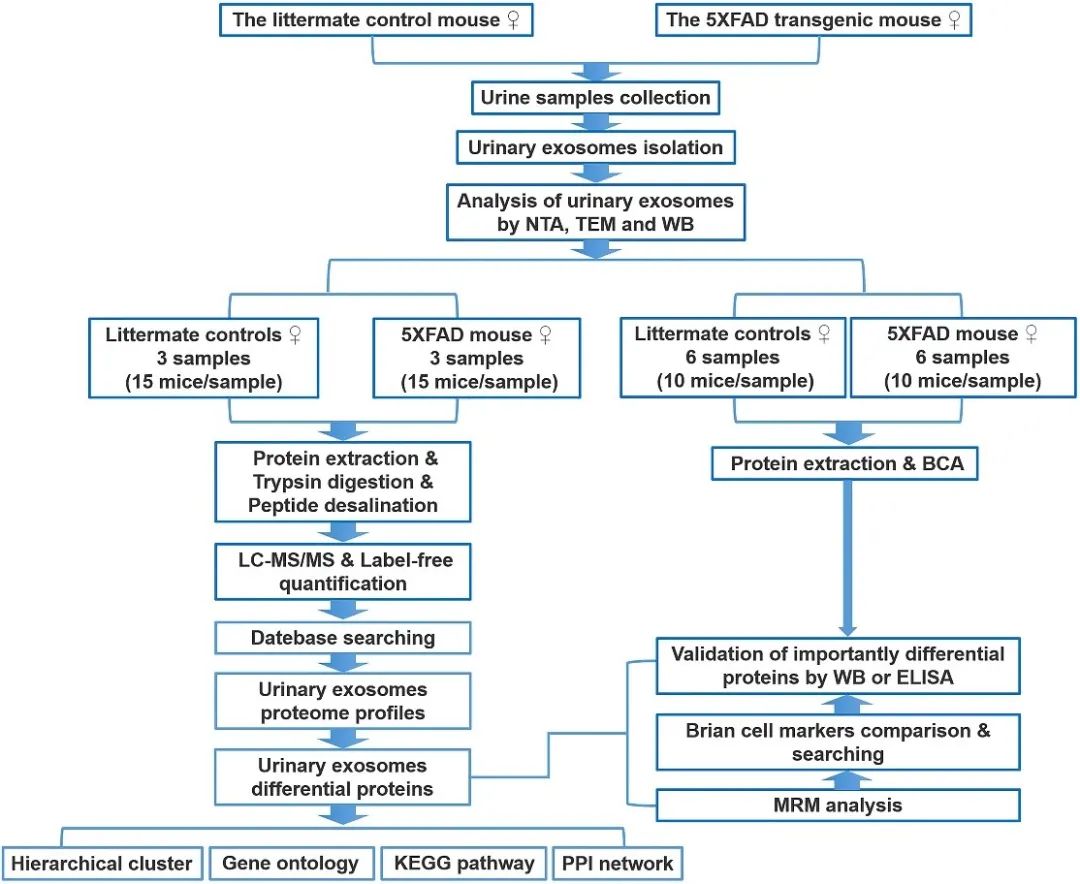Exosome proteomics is a rapidly developing field that has the potential to revolutionize the way we diagnose and treat diseases. One exciting application of exosome proteomics is in the search for novel markers of disease development. Exosomes are known to contain a variety of biomolecules, including proteins, nucleic acids, and lipids, which can be analyzed using mass spectrometry and other proteomic techniques. By analyzing the protein content of exosomes, researchers can identify new biomarkers for diseases such as cancer, neurodegenerative diseases, and infectious diseases. These biomarkers can then be used for early detection, monitoring disease progression, and developing new therapies. The study of exosome proteomics has the potential to significantly advance our understanding of disease development and improve patient outcomes.
Case 1 Identification of potential non-invasive early biomarkers of Alzheimer's disease (1)
Alzheimer's disease (AD) is a common disease of aging and is an incurable neurodegenerative disease. Patients develop amyloid plaque deposits in the brain, and these deposits can disrupt the structure and function of brain neural tissue, leading to neuronal cell death and loss of cognitive function. Alzheimer's disease is important for early intervention in AD by identifying candidate biomarkers before β-amyloid plaque deposition occurs.
Researchers collected urine samples from 5XFAD mice and control mice from the same litter and isolated and extracted exosomes. Exosome identification was performed by NTA particle size concentration analysis, and WB verified exosome marker expression. Subsequently, the exosomal proteins were analyzed qualitatively and quantitatively by LC-MS/MS. Significant differences were found between the 5XFAD group and the control group for 88 urinary exosomal proteins. The expression of 53 proteins was up-regulated and 27 proteins were down-regulated compared to the control group. Subsequently, after clustering and GO analysis, 6 proteins were identified as AD biomarkers and had high potential to be considered as candidate urinary exosome biomarkers for AD. The differential proteins were then validated by WB, ELISA and MRM targeting protein analysis.
Validation results suggest that some urinary exosomal proteins, particularly Annexin 2 and Clusterin, are able to detect differences before amyloid beta plaque deposition, which may be an ideal source of non-invasive biomarkers for AD prevention.

Workflow of isolation, characterization, and proteomics of urinary exosomes in 5XFAD transgenic mouse model of AD and littermate control.
Case 2 Paclitaxel and adriamycin use exosomes released by tumors during chemotherapy to alter the lung microenvironment (2)
To measure whether tumor-derived EVs are involved in PTX-induced breast tumor metastasis, PTX-treated tumors were cultured in vitro and tumor culture supernatant exosomes were extracted, and exosomes produced by paclitaxel-treated cancer cells were found to significantly promote tumor cell colonization in the lung. The investigators hypothesized that the chemotherapy-induced enhancement of the pro-tumor metastatic ability of exosomes was due to the proteins they carried. Therefore, proteomic analysis of exosomes from tumor cells treated with PTX as well as CREMO by liquid chromatography-mass spectrometry (LC-MS) revealed that exosomes from PTX-treated tumor cells were enriched in ANXA6 protein. ANXA6 protein content in EVs could also be increased after DOX treatment. Subsequently, the exosomal protein ANXA6 was confirmed to promote the lung metastasis function of breast cancer by gene knockdown and expression. Also, the blood exosomal function molecule ANXA6 was validated in clinical breast cancer patients.


Tumor exosome proteomics after PTX chemotherapy
Reference
- Song, Zhiqi, et al. "Comprehensive proteomic profiling of urinary exosomes and identification of potential non-invasive early biomarkers of Alzheimer's disease in 5XFAD mouse model." Frontiers in Genetics 11 (2020): 565479.
- Keklikoglou, Ioanna, et al. "Chemotherapy elicits pro-metastatic extracellular vesicles in breast cancer models." Nature cell biology 21.2 (2019): 190-202.







